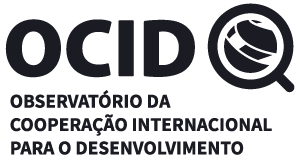
About
The OCID (Observatory for International Cooperation for Development) is an initiative of Brazil with the aim of providing an information platform on International Cooperation for Development (CID) for the general public.
Objective
Provide information related to the CID, including actors, documents, data sources, terminology and events.
Proposal
Provide a platform with integrated information on the CID practice that allows consultation with public agents, academia and society in general, with access in 4 languages. The Observatory allows the cumulative inclusion of information in the consultation modules: actors, library, data sources, glossary and events based on criteria designed to ensure standardization.
Main features of International Development Cooperation

Cooperation
An interaction and exchange relationship between two or more partner entities. Interaction occurs because of differences or similarities between actors. The exchange can be material or non-material. They are based on perceptions of potential importance for the participating actors.

International
International cooperation is an aspect of international relations. The participant actors can be public or private: States, subnational entities, international and intergovernmental organizations, businesses, philanthropic institutions and other civil society actors.

Development
International cooperation is intended to foster environmentally sustainable socio-economic development based on the 2030 Agenda adopted by the United Nations. The international cooperation mechanisms and practices must provide the means, capacities and knowledge that are needed to overcome the structural causes of poverty. Supports the permanent improvement of economic, social and cultural development levels in a fair, peaceful, balanced and sustainable manner in developing countries involving the joint efforts of public and private actors.

Sobre
O OCID (Observatório da Cooperação Internacional para o Desenvolvimento) é uma iniciativa do Brasil com o objetivo de disponibilizar uma plataforma de informações sobre à Cooperação Internacional para o Desenvolvimento (CID) do público em geral.
Objetivo
Disponibilizar informações relativas à cooperação internacional para o desenvolvimento, incluindo atores, documentos, fontes de dados, terminologias e eventos.
Proposta
Disponibilizar uma plataforma com informações integradas sobre a prática da CID que possibilita a consulta de agentes públicos, academia e sociedade em geral, com acesso em 4 línguas. O Observatório permite a inclusão cumulativa de informações nos módulos de consulta: atores, biblioteca, fontes de dados, glossário e eventos com base em critérios destinados a assegurar padronização.
What is South-South Cooperation?
South-South Cooperation (SSC) covers the political, economic, social, cultural, environmental, and technical domains among developing countries. SSC can take various forms, including bilateral agreements, regional initiatives, and trilateral and multilateral collaborations. This highlights its adaptability and inclusiveness, as well as its ability to allow countries to choose the most effective and specific means of collaboration considering their national contexts, with a view to promoting their development goals.
Measuring South-South Cooperation
The adoption of the 2030 Agenda and its targets requires a measurable framework to monitor progress in implementing the Sustainable Development Goals (SDGs), including support for development. In this sense, measuring of South-South cooperation plays a key role in monitoring the achievement of target 17.3 of Goal 17, “Partnerships for the Goals”.
The essence of South-South Cooperation evokes solidarity among the peoples and countries of the global South. A process led by developing countries resulted in the initial proposal for a voluntary conceptual framework to measure SSC, which is currently in the testing and validation phase.
The “Manual for the Framework to Measure South-South Cooperation: Technical and Procedural Aspects for pilot testing” published in November 2024 by the United Nations Conference on Trade and Development (UNCTAD), aims to support the framework’s pilot test and data collection.
Meet the Manual for the Framework to Measure South-South Cooperation
The “Manual for the Framework to Measure South-South Cooperation: Technical and procedural aspects for pilot testing” has eight chapters, namely:
Chapter 1 — Introduction: brings conceptual definitions and traces the historical panorama of SSC.
Chapter 2 — Importance of data on South-South Cooperation flows: considers the role of data in planning, strategic management, and resource allocation; discusses the value of data and challenges linked to quantification; and deals with the context of indicator 17.3.1 of the SDGs.
Chapter 3 — Framework to Measure South-South Cooperation: Describes the architecture, concepts, and definitions used in the “Framework to Measure South-South Cooperation”.
Chapter 4— National institutional set-up for quantifying South-South cooperation: This chapter deals with the institutional ecosystem—the agencies and responsibilities involved in quantifying South-South Cooperation—and with sharing and communicating the data obtained.
Chapter 5—Data collection process: It deals with the planning, preparation, obtaining, and validation of the data-receiving activity.
Chapter 6 — Quality assurance and validation: Presents principles on quality assurance, following official statistics practices.
Chapter 7—SSC data analysis: This chapter addresses the analysis of SSC data at national, regional, and global levels.
Chapter 8—Towards reporting SSC data to the SDGs: This chapter focuses on the communication of SDG indicator 17.3.1.
Chapter 9 — Glossary of terms: This section defines terms essential to understanding the “Framework to Measure South-South Cooperation.”
Email: ocid@abc.gov.br
SAF/Sul Quadra 2, Lote 2, Bloco B, 4º Andar – Edifício Via Office
CEP: 70.070-600 | Brasil – Brasília – DF
Email: contato@abc.gov.br
SAF/Sul Quadra 2, Lote 2, Bloco B, 4º Andar
Edifício Via Office
CEP: 70.070-600
Brasil – Brasília – DF

